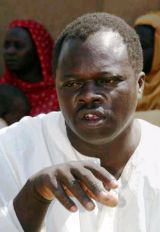FEATURE-Sudan war victims reluctantly join north
By Opheera McDoom
UM SERDEIBA, Sudan, April 24 (Reuters) – When he was 15, Younan Ghanam walked for three months from town to town in vast southern Sudan to escape Africa’s longest civil war.

|
|
Sudanese refugee Mohammed Ahmed Osman, talks to a journalist about his long journey from Darfur region of Sudan to Kakuma refugee camp in northern Kenya, February 22, 2005. (Reuters). |
He made it to Kenya, learned English and became a teacher.
“I felt so guilty that I was leaving my people behind to die of hunger, but my objective was to go to school,” Ghanam said.
Now, at 28, he is back home in the rocky Nuba Mountains teaching at a school on the rebel-held side of Um Serdeiba, a town half held by the rebels of the Sudan People’s Liberation Army (SPLA) and half by the northern Arab government.
The town’s checkpoint marking the border between the two sides consists of an unmanned wooden stick on two boulders, testament to the success of a recent ceasefire in the area.
But soon Ghanam will find himself under the control of the Khartoum-based government whose quest to control the south over 20 devastating years of war had forced him to flee his valley home where natural resources are plentiful in the first place.
Under a January peace deal between the SPLA and Khartoum to end the 21-year-old war, the whole town will be under government control — and Ghanam is not happy.
The teacher left his job in a modern school in Kenya to come to the Sudanese school — six clay and straw huts with no electricity and little facilities.
He is from a non-Arab tribe and says he does not want to be part of the north, whose Arab-dominated government had betrayed him. But, he said, he was not a secessionist either.
“We don’t want to belong to the north,” he said. “We will see if peace will really come, but we still do not want to be under that northern government,” said Ghanam, looking slightly out of place in his Western clothes against the backdrop of a dilapidated town.
MOST PEOPLE NOT HAPPY
The war broadly pitted the Islamist government based in Khartoum against rebels from the mainly Christian and animist south, complicated by issues of oil, ethnicity and ideology.
It claimed 2 million lives, mainly from hunger and disease, and forced more than 4 million people from their homes.
Often described as the Arab-African border of Sudan, the multi-lingual Nuba people feel neither northern nor southern.
However during the years of war and displacement, many of the non-Arab Nubans felt the Arab government favoured Arab tribes over them so began to support the rebels.
After years of negotiations the SPLA and the government agreed that the Nuba Mountains, one of the most fertile farming areas in Sudan, would remain part of north Sudan with an option to enter into future talks if people were unhappy.
Under the peace deal Sudan’s south has the right to a referendum to decide whether to secede from the north after 6 and a half years.
Kovong Samadia, 40, is a fellow teacher who did not flee Um Serdeiba, despite the bloodshed and days of bombardments. He stayed throughout the long years of war.
“We are all the tribes of Sudan,” he said. “But still they have to respect our people,” Samadia said forcefully. He lost his brother and parents during the war.
The local government army commander, Ali Baraka al-Seddig, said it was clear most people in Nuba Mountains were not happy with being part of the north.
“Yes, but this is what has been agreed and we have to work with it to make it work,” he said.
Samadia and others in Um Serdeiba are some of the few who understand what the peace deal means on the ground, thanks to a local information campaign by the European-U.S. Joint Monitoring Commission (JMC) which has been monitoring the ceasefire.
Unlike the rest of southern Sudan where sporadic fighting has broken out despite the ceasefire, Nuba Mountains have not seen any clashes.
